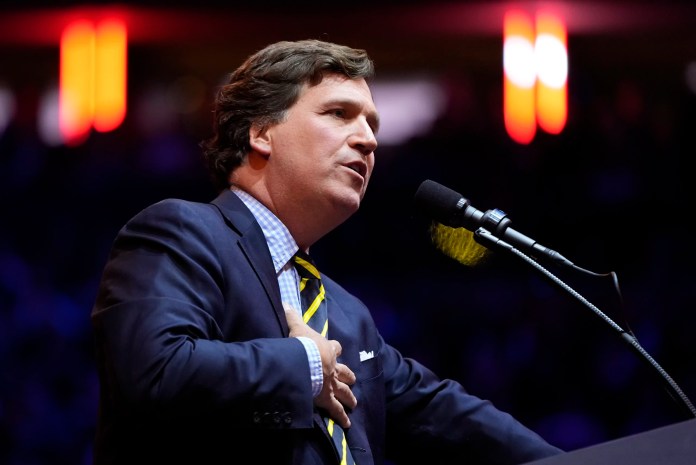In the days following his killing, conservative activist Charlie Kirk has, in a sense, become all things to all people.
Catholic and Orthodox Christians claimed that the late protestant campus speaker was on the verge of converting to their respective faiths, advocates in support of Israel pointed to Kirk’s Zionism as a key pillar of legacy while some claimed he was souring on Israel in the months before his death, and many said he would have encouraged efforts to shut down individuals or organizations fomenting political violence, whereas still others see such retaliation as an affront to Kirk’s love for freedom of speech.
While it is impossible to know how Kirk would have reacted to his own death, and it is certain that ideologues of varying colors will make claims on his legacy, his widow is, perhaps, the most credible indication of the man’s parting wishes.
“So to all of the young people who felt inspired by my husband’s faith and hard work, all of you already know what Charlie would want you to do,” Erika Kirk said in a speech delivered days after her husband’s death. “If you’re in high school or if you’re in college, go find your local Turning Point USA chapter. Join it. Stay involved. He wants you to make a difference, and you can. You can. The movement’s not going anywhere, and it will only grow stronger when you join it. If there isn’t a chapter, you can’t find one, then start one. There is no excuse.”
Kirk’s speech had a strong religious angle, with his widow stating that he “wanted everyone to know that if they confess, if they confess the Lord Jesus Christ who rose from the dead, then they will be saved.”

Remarks from Kirk’s widow were well received on the Right, with little controversy as to her interpretation of her late husband’s wishes. Other assertions about Kirk’s legacy have been more divisive.
An opinion piece written by George Washington University law professor Jonathan Turley titled “Charlie Kirk wouldn’t fire people who hated him, he’d win them over” sparked a particularly spirited debate on social media.
In his piece, Turley argued that Kirk “wanted people to be able to express themselves regardless of how the majority felt about their views” and that he would therefore oppose most of the firings of individuals who made light of or justified his death. Turley did qualify his position, however, by stating that people who used “their official, academic or corporate positions to espouse hateful messages,” or workers whose positions require them to care for the lives of conservatives, could be subject to legitimate termination.
“Hate speech in the United States is protected speech,” Turley wrote. “The crackdown on speech deemed hateful, inflammatory, or intolerant has been the signature of the left, the very thing that Kirk campaigned against.”
Vice President JD Vance, a friend of Kirk’s, took the opposite position, calling on citizens to report employees for making callous remarks about the activist’s death with the aim of getting them fired.
“Civil society, Charlie understood this well, is not just something that flows from the government,” Vance said while hosting a memorial episode of the Charlie Kirk Show last week. “It flows from each and every one of us. It flows from all of us. So when you see someone celebrating Charlie’s murder, call them out and, hell, call their employer. We don’t believe in political violence, but we do believe in civility, and there is no civility in the celebration of political assassination.”
Contra Vance, others have claimed such behavior could be characterized as cancel culture, which Kirk opposed.
“It would be deeply ironic if Charlie Kirk’s death was used to wipe out his life’s work on free speech,” liberal commentator Cenk Uygur wrote of the movement. “I think anyone suggesting we take away people’s right to speak, no matter how offensive, would be attacking Kirk’s legacy, not supporting it.”
Vance welcomed the debate over Kirk’s legacy but urged conservatives to avoid infighting for the time being and to unite in mourning.
“To my friends on the political Right: I understand the feeling that people are putting words into Charlie Kirk’s mouth,” the vice president wrote on Wednesday. “At some level, I agree and share your frustration. Try to remember: a lot of people loved Charlie. It is natural for them to debate his views and his legacy. In fact, I think Charlie would welcome that. But for now, let’s celebrate our friend, remember his impact, and save the debate for after his funeral.”

White House deputy chief of staff Stephen Miller took it a step further, citing his last conversation with Kirk, in which Miller said Kirk expressed support for the administration’s efforts to take action against left-wing groups for allegedly fomenting political violence.
“The last message that Charlie sent me was, I think it was just the day before we lost him, which is that we need to have an organized strategy to go after the leftwing organizations that are promoting violence in this country,” Miller said on Monday. “I will write those words onto my heart, and I will carry them out.”
While details on how the Trump administration will implement this strategy are scant, Vance mentioned the Ford Foundation and the Soros family’s philanthropic network, major players in left-of-center financing, by name as organizations in the government’s sights. President Donald Trump has indicated that investigations into groups are “already” underway, with his chief of staff stating that these operations were already running before Kirk’s assassination.
Israel, a nation which Kirk was a vocal supporter of, has also emerged as a flashpoint following his death.
Tucker Carlson, for instance, has made waves by claiming that Kirk had confided in him and others that he was growing resentful of Israeli Prime Minister Benjamin Netanyahu for “using the United States” to advance his interests at the expense of Americans. According to Carlson, Kirk’s donors “tormented him until the day he died” after the former Fox News host linked Jeffery Epstein to Mossad and lamented how difficult it is for public figures to criticize the Israeli government during a speech at a Turning Point USA event in July.
Sen. Ted Cruz (R-TX) has pushed back against these claims, stating that he “knew Charlie well [and] indeed the very last conversation we had was how deeply concerned he was about the rising, toxic wave of antisemitism on the right.” Cruz’s rebuttal didn’t touch on Carlson’s claims of frustration with Netanyahu, which former congressman Matt Gaetz said are largely true based on his relationship with Kirk.
Netanyahu himself has been accused of hijacking Kirk’s legacy to serve his own ends, blaming Kirk’s death on the union between “radical Islamist” groups and “ultra progressives.”

A third front has opened in the war over Kirk’s legacy concerning his religion.
Kirk, an outspoken and devout protestant Christian, was supposedly considering Catholicism and Eastern Orthodoxy around the time of his death, in the telling of some online. These claims, however, lack hard evidence.
Candace Owens, a longtime friend of Kirk who has recently veered into promoting conspiracies, claimed that he was “definitely on the brink” of “changing some of his perspectives” and indicated that he was “praying the Rosary” and “going to Mass.” Some large Catholic influencers amplified her claims.
Kirk had been photographed appearing at Catholic Masses, though this doesn’t necessarily mean he was inquiring into the faith.
Owens, a vocal critic of Israel, has also claimed that pro-Israel billionaire Bill Ackman staged an “intervention” to blackmail Kirk into increasing his support for Israel, a claim Ackman countered by producing recent cordial text messages between him and Kirk.
Rob McCoy, Kirk’s pastor, issued a statement denouncing Owens’s recent actions.
“Charlie Kirk was a friend to Candace and never publicly spoke poorly of her, though he disagreed with her,” he said. “He never operated nor entertained gossip or innuendo concerning Candace. My only comment I offer regarding Candace is this: I only wish at this tragic time of mourning, she would be the friend to Charlie that he was to her. He would never have treated Candace or her family in such a way had God forbid this tragedy been hers.”
Carlson, meanwhile, stated that Kirk was “very interested in Orthodoxy.”
“So apparently Kirk, a very vocal Evangelical, was considering Catholicism and Orthodoxy before his death?” pro-Israel journalist Corey Walker wrote of the dynamic. “It’s really depressing that Tucker and Candace are clearly using his death for professional leverage. Even death can’t stop the grift machine.”
WHAT WE KNOW ABOUT TRUMP’S ‘MAJOR INVESTIGATION’ INTO LEFT-WING GROUPS FOLLOWING KIRK ASSASSINATION
While it is ultimately unknowable what religious sentiments were present in Kirk’s mind leading up to his death, it is clear that Christianity was deeply important to him.
A few months before his assassination in Utah, Kirk disclosed what he ultimately wanted to be remembered for.
“If everything completely goes away, how do you want to be remembered?” podcast host Jack Selby asked him in late June.
“If I die?” asked Kirk.
“Everything just goes away,” Selby responded. “If you could be associated with one thing, how would you want to be remembered?”
“I want to be remembered for courage for my faith,” Kirk said.
